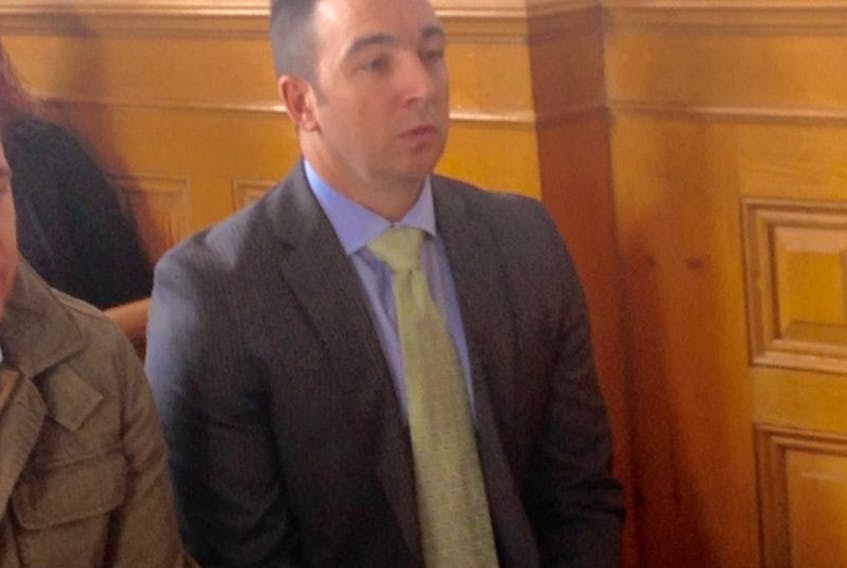The jury in Snelgrove’s trial has been sequestered today to render a verdict in the case of the officer, who faces a charge of sexual assault.
The six women and five men — who saw one member dismissed the first day of the trial — sat through almost two hours of instruction on the law this morning from Justice Valerie Marshall at Newfoundland Supreme Court in St. John’s. They were expected to begin deliberations after lunch.
Jurors must sift through a week-and-a-half of evidence, including testimony from at least eight witnesses —including Snelgrove and the complainant — to determine if the 39-year-old Snelgrove is guilty or not guilty of sexually assaulting a 21-year-old woman while he was on duty Dec. 21, 2014.
The woman testified last week that after a night of partying at a downtown bar, she was extremely drunk when she approached Snelgrove's police car, which was parked on Water Street, and got a ride home.
She remembered some conversation on the way home and that she gave him directions.
She said when they arrived, she and Snelgrove walked to the house, but she couldn't find her keys and with his help, she climbed in through a window and then let him in the door.
She said she couldn't remember much of what happened because she was so drunk and it was so long ago, but said the next thing she knew, he was having anal sex with her.
She said she remembers hearing him speak to her and seeing him walk to the bathroom to clean up.
She said Snelgrove didn't use force on her.
She told the court that she had no intention of having sex with Snelgrove and that she just wanted to go home to sleep. She said she felt it would be safer to go with a police officer than in a taxi.
However, Snelgrove testified that she appeared fine when she approached the car and that he didn't see any signs of intoxication.
He said they talked all the way en route to her place in the east end of the city. The conversation included such topics as the police officers she knew, her friends, his job, her job and her aspirations to go back to school.
She also told him that she thought he was very attractive, he said. He said he returned the compliment and said she was cute or pretty.
He said she gave directions to where she lived.
When the woman said she couldn’t find her keys, Snelgrove offered to drive her to a friend’s house.
He said she had no problem getting in the window and then opened the door and invited him in.
He said he’s not sure why he went inside her place, but that when he did, she made sexual advances and he responded.
He said he believed the sex was consensual.
The judge told jurors that in order to find Snelgrove guilty, the Crown must prove all four essential elements beyond a reasonable doubt: 1) that Snelgrove intentionally applied force 2) the force was sexual in nature 3) the woman did not consent and 4) Snelgrove did not honestly believe the woman did not give consent.
Consent is at the heart of the case.
With regards to the third element, she said jurors must be satisfied that the woman’s volunteer agreement was invalid because she was incapable of consenting because she was unconscious.
“The law is: mere drunkenness is not the equivalent of being incapable...,” Marshall said.
“The Crown must prove she was so incapable, she was unable to consent.”
She told jurors to assess the witnesses’ evidence about her level of intoxication.
She pointed out that the complainant said she had five coolers and was not overly drunk before going to a downtown bar at 12:30 a.m. The woman said she couldn’t recall how much she had to drink downtown.
At least four of her friends who testified said she appeared fine that night and that they had no concerns about her.
Marshall pointed out at least two inconsistencies in the woman’s testimony.
The first was about how much she had to drink downtown. At the trial, she testified she may have had one drink, but she’s confident she became more intoxicated. At the preliminary inquiry last year, however, she said she wasn’t sure if she got more drunk while downtown.
The other inconsistency, the judge said, was about the phone call she made to a friend when she realized her keys were missing. She first said she couldn’t remember calling a friend and only realized she did when she saw the number on her phone the next day. But in cross-examination, she recalled some of the conversation with her friend.
Marshall told jurors inconsistencies can be used to assess a witness’s credibility, but that it was up to them how much weight to put on them.
On whether Snelgrove honestly believed the women voluntarily agreed to having sex, Marshall said, “Belief may be honest, but does not have to be reasonable.”
She went on to say, “Even if you’re not left with reasonable doubt by the defence evidence, you must still ask yourself whether on the whole of the evidence, you are satisfied beyond a reasonable doubt that Carl Snelgrove is guilty. If you are not satisfied beyond a reasonable doubt, you must find him not guilty.”
Marshall told jurors to use common sense when reaching a verdict.
“It is your duty to discuss the issues and to reach a just verdict according to the law and the evidence,” she said.
She told them to reach a verdict, “without sympathy, prejudice or fear.”
Twitter: TelyCourt










